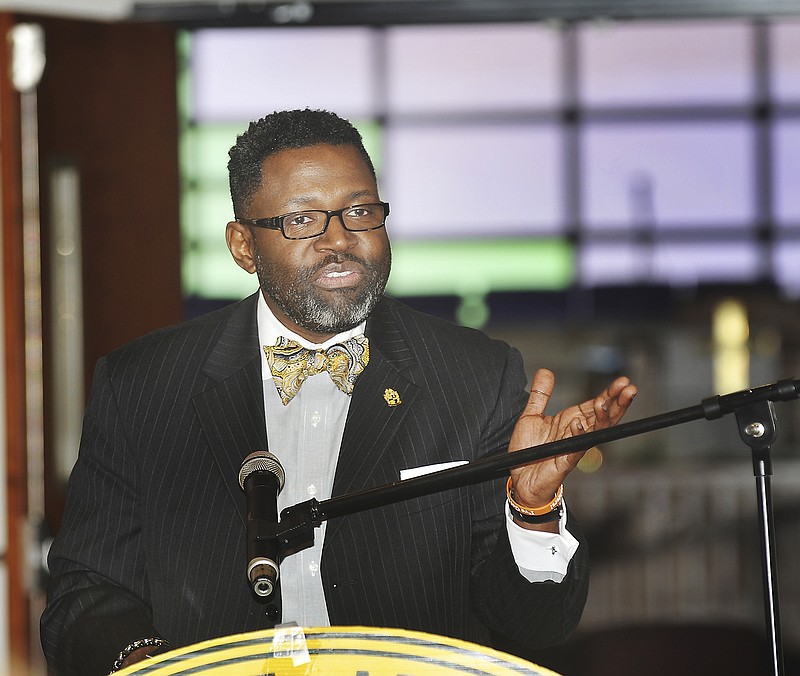As dozens of people gathered Monday morning at Quinn Chapel A.M.E. Church to celebrate the life and legacy of Martin Luther King Jr., a cloud hung over the room.
The breakfast brought together a mix of young, old, black and white city leaders to celebrate King's legacy on Martin Luther King Jr. Day, more than 50 years after his assassination. Still, those in the room said forces are working to expose divisions that King devoted his life to erasing.
"In our world, everything that can go wrong has gone wrong," Marrix Seymore, Lincoln University School of Education dean, told the crowd. "If there was ever a time to be united, the time is now."
About 110 people attended the breakfast Monday morning at an event hosted by the Jefferson City NAACP. The event, and another at St. Mary's Hospital on Monday afternoon, celebrated King's life and contribution to society.
Seymore gave the keynote address at the NAACP celebration and told attendees to become active or stay active in their communities.
"Cole County, when we say we are culturally diverse, we have to make sure all cultures are represented," Seymore said.
Missouri NAACP President Rod Chapel Jr. commended the organization's strong relationship with Jefferson City Police Department. Still, the rate at which black drivers are stopped is too high, Chapel said after the event.
In 2017, the rate at which black residents were stopped by the Jefferson City Police Department decreased slightly from 2016, according to a report compiled by former Missouri Attorney General Josh Hawley. Still, black drivers got stopped by JCPD at almost twice the rate of white drivers, almost six times the rate of Hispanic drivers and more than six times the rate of Asian drivers, according to the report.
"That's still out of proportion," Chapel said. "Last year, we didn't go up, but we need to be going down."
Work also needs to be done to ensure minority and white students are disciplined in local schools at the same rates, Chapel said. In November 2017, white students made up 62.8 percent of Jefferson City Public Schools' students, but represented only 41.8 percent of disciplinary incidents, according to News Tribune reports.
Non-white students made up 37.2 percent of students, but represented 58.2 percent of disciplinary incidents.
Like Seymore, Chapel said America is divided in a way that it seems like it has not been in the recent past.
Charles Jackson worked for the Missouri Highway Patrol for 30 years and now works part-time at Freeman Mortuary. After the civil war granted enslaved African Americans their freedom, Jackson said, Jim Crow laws clamped down on the expansion of those rights.
The civil rights movement King led similarly expanded rights for black Americans, Jackson said. Today, Jackson sees groups trying to push back on those gains again.
"We're all in this together, so we need to work together to get things done," Jackson said after the event. "We've lost focus on that."
Still, Jackson had hope. He echoed Seymore's speech and said people need to get active to change the attitude of the country.
"Everybody should be participating in our government," Jackson said. "People become apathetic, and they wait for somebody else to get involved."
Jackson later attended a celebration held by St. Mary's Hospital. Joe Jimmerson, an SSM Health St. Mary's security officer, delivered King's "I've Been to the Mountaintop" speech. King gave the speech in Memphis on April 3, 1968, one day before his assassination.
Jimmerson grew up in Toone, Tennessee, which sits about 70 miles east of Memphis. Now age 64, he was one of the first black students integrated into the town's white school district in 1967.
"When I first went to school there, they didn't want us there," Jimmerson said after the event. "But two or three years later, we all became one."
At a young age, King inspired Jimmerson. Today, he still carries that hope with him.
"My hometown is entirely different," Jimmerson said. "During the 1950s and 1960s, there was a lot of hatred in the South."
Michael Misko, SSM Health St. Mary's regional president of physician and ambulatory services, served as SSM Health's keynote speaker. Misko focused on King's relationship with Jesus.
King's faith and knowledge of scripture formed the basis for everything King did, Misko said.
"It went way beyond social activism," Misko said. "He understood that in our whole life we need to fight injustices."

